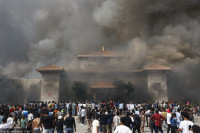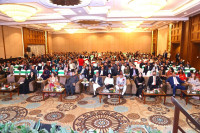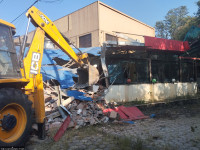Valley
Kathmandu has been declared open defecation free, but people are still pooping on the streets
Sanitation experts and even city officials themselves say there is nothing substantial behind the declaration..jpg&w=900&height=601)
Anup Ojha
The district of Kathmandu declared itself “open defecation free” on Tuesday, but across the capital city, piles of faeces await errant feet like mines, ready to explode upon contact. A walk from Jamal to Ratnapark and up the many overhead bridges should make it clear to anyone that the city of Kathmandu is anything but free of public defecation.
Tuesday’s programme at the Kathmandu City Hall was supposed to be grand, but the event, like the announcement it was making, turned out to be a sham. Deputy Prime Minister and Minister for Defence Ishwar Pokhrel never showed up, neither did Kathmandu Mayor Bidya Sundar Shakya.
“The deputy prime minister could have refused to join because this declaration makes no sense,” a city official who was part of the organising committee admitted to the Post on condition of anonymity. “Or maybe he wanted to avoid criticism from the media and the public as there is nothing substantial behind this declaration.”
At the programme, Narayan Silwal, a provincial lawmaker from the Nepal Communist Party, announced that alongside Kathmandu, Kapilvastu, Mahottari and Sarlahi were also declared “open defecation free”, bringing the total number of such districts to 75.
The deadline for the campaign is September 30, and until last month, 11 districts had yet to be declared free of open defecation. With the deadline fast approaching, the government is now escalating its efforts. Now, there are just two districts left. But concerns remain over this declaration, with criticism levelled at just how sustainable such toilets are and if the government’s Open Defecation Free campaign has even worked.
In Kathmandu and many areas in the Tarai, defecating in open spaces has become the norm due to a lack of toilets and proper awareness of hygiene. A recent government survey of the Valley found that Kathmandu district had just 38 public restrooms, but most of them were “in poor condition”, and almost none of them met standards. The survey was conducted by teams from the four metropolises in the Valley—Kathmandu, Lalitpur, Madhyapur Thimi and Kirtipur.
According to city planners and environmentalists, the government is making these announcements in haste as the deadline is almost here.
“There have been good efforts in the Tarai, especially Bara, Parsa and Dhanusha, but the announcement has been made in haste,” said environmentalist Bhushan Tuladhar.
Others say that the decision could’ve been prompted by Indian Finance Minister Nirmala Sitharaman’s July announcement that India would be open defecation free by October 2.
“It seems the government is rushing to become the first nation in South Asia to declare itself open defecation free, but without any tangible effort,” said Bipin Dangol, executive director for the Environment and Public Health Organisation, a non-profit that works in the field of sustainable community development. “If you look at Kathmandu, there might be toilets in over 95 percent of households, and public spaces don’t have toilets with proper sanitation. This announcement does not hold any meaning unless the government acts to solve all those problems, not only in Kathmandu but in all districts that have already been declared free of open defecation.”
The government, in 2011, had come up with an ambitious long-term sanitation and hygiene master plan, which included the elimination of open defecation by providing access to toilets and proper sanitation by 2017. The 2015 earthquake and subsequent trade embargo by India had caused the deadline to be extended to the end of September 2019. But the government is unlikely to meet that deadline.
According to Haridatta Paudel, member secretary at the district water and hygiene coordination committee, Rs270 million from the consumer’s fund and Rs66.5 million from the government had been spent on constructing 55,500 toilets in households across Kathmandu district. But sanitation experts say that without additional measures to work hand in hand with the toilets, the campaign will not amount to much.
“There is no mechanism for faecal sludge management, and all human excreta are mixed in the rivers,” said Dangol. “There is no solid waste management and waste work management.”
Even officials from Kathmandu Metropolitan City do not seem to believe in the declaration.
“The announcement was made just to attract public attention and make people aware,” said Kedar Neupane, chief executive officer at the Kathmandu Metropolitan City. “As the government has already announced Kathmandu as open defecation free, we just need to accept it.”
***
What do you think?
Dear reader, we’d like to hear from you. We regularly publish letters to the editor on contemporary issues or direct responses to something the Post has recently published. Please send your letters to [email protected] with "Letter to the Editor" in the subject line. Please include your name, location, and a contact address so one of our editors can reach out to you.




 16.12°C Kathmandu
16.12°C Kathmandu.jpg)










